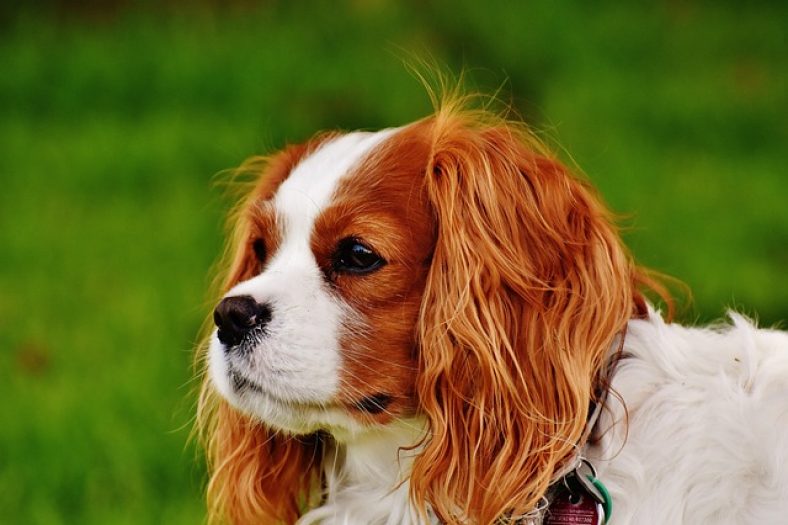A lot of us love nature, like myself, and some of us like to hike and can take our dogs with us, so a question you’d ask when you’re planning to adopt a Cavalier is “Can Cavalier King Charles Spaniels go hiking?”
Cavalier King Charles Spaniels can go on moderate hikes, though note that these dogs don’t have infinite stamina and will need to rest at times. Also, make sure to start slow, especially on your first hiking trip, so that they can get used to the exercise. Lastly, make sure that you know exactly what you need to take with you when you hike and the health conditions that can prohibit your dog from hiking.

How Far Can A Caviler King Charles Spaniel Hike?
At first, when you’re just starting out letting your Cavalier hike, don’t hike more than a mile or two.
The fact is, when you first get your Cavalier, he will need to settle into your home and get used to you before he does anything too crazy.
Their previous owner (if they had one) may or may not have let them go on hikes either, so it’s very possible that they are completely new to it.
If you have had your Cavalier King Charles Spaniel for a while, you can go on longer hikes, though as I mentioned earlier, no dog has infinite stamina, so try not to tire your dog too much.
I wouldn’t let your dog go on any hikes until he’s about 1 year of age when he is strong and has fully developed muscles.
Can Cavalier King Charles Spaniels Camp?
Cavalier King Charles Spaniels can camp outside, though do note that they can run away if you’re not careful.
While I’m sure your Cavalier King Charles Spaniel loves you, he also has a high prey drive and can get distracted by a squirrel or another small animal pretty quickly.
Considerations Before You Start Hiking
So, let’s look at the considerations before you begin your hike.
The considerations are the food and water supply, when and where you’re going hiking if you have all the other supplies you need, how old your Cavalier is, and whether or not it has any health conditions.
Food & Water Supply
You must have enough food and water. While this may sound obvious, you may not have packed enough.
While you don’t have to get a ton of food and water, make sure you have more than you need as there is always that possibility that you get stranded.
Where You’re Going To Hike
Where you’re going hiking also plays a big role into if he should hike and if so, how long.
Make sure that when you go hiking, there aren’t any steep slopes and that the ground is fairly level.
This is especially necessary if you have an older dog with health conditions like arthritis and bad back problems. Steep slopes will do nothing but make health conditions like arthritis and bad back problems worse.
When You’re Going Hiking
The time you’re going hiking also has a big impact on what you should take with you and where and how long you should hike.
If it’s in the middle of summer or spring, consider taking your time and getting extra food and water as it can get fairly hot in these seasons, depending on where you are.
If it’s in the fall, this is a good temperature (in my opinion) to go hiking as it’s not too cold or hot, though you may still need to take a coat and your Cav may even need a coat as well.
If you’re hiking in the winter, however, you’re going to do the obvious things like getting a coat, food and water, but you may also deal with ticks and fleas.
While you may not think about there being a lot of ticks or fleas in the winter, they are still there and seek a warm place to live on, and what is a better warm place in the vast forests than your Cavalier King Charles Spaniel?
So, yes they are certainly still a problem in the winter, so consider getting a tick and flea repellent.
I recommend checking out this article from The Spruce Pets if you’d like to learn more about the best flea and tick repellents.
Other Supplies You Will Need
Some of the obvious supplies you will need are good hiking boots, a water bottle, a backpack, a good pair of hiking boots, shoes, socks, and sunglasses if you’re going in the spring or summer.
While I am not a hiking expert by any stretch of the human imagination, I do know that you should always be prepared for the worst case scenario so that you and your Cavalier King Charles Spaniel will be safe at all times.
How Old Your Cavalier Is
As I alluded earlier, the age of your Cavalier also has a big impact on where and how long you hike.
Puppies should not hike at all, as during their age, their muscles are still developing and won’t be able to hike for very long distances.
Likewise, senior Cavaliers should not hike very much as they typically have back problems and health conditions like arthritis that effect the bones and make overall makes movement a lot harder on the body.
If Your Cavalier Has Any Health Conditions
As I just said, senior Cavaliers should not hike as they can get health conditions like arthritis and back problems, though younger dogs can have health conditions as well.
While arthritis is typically found in older dogs, it can also occur in younger dogs, especially if it’s a larger dog breed.
I will talk about health conditions in the next section of this article.
Health Conditions That Prohibit Your Cav From Hiking
We all want to keep our dogs healthy and comfortable, right? So, what are some more health conditions that can effect how long your Cavalier can hike.
Let’s find out!
Cataracts
While cataracts don’t effect your dog’s joints, they can make it harder for your dog to see which will effect whether or not they can hike.
Dogs and cats both can develop cataracts, though dogs are the most likely to develop them.
Generally, there are incipient cataracts that are minor and typically have less of an effect on your dogs vision, though there are other cataracts that can even make your dog blind and wrinkle the capsule and shrivel up the lens.
Mitral Valve Disease
Both the left and the right side of the heart has valves which help prevent blood moving the wrong way (backwards). The left valve is called the mitral valve and the right valve is called the tricuspid valve.
In mitral valve disease, the mitral valve becomes inefficient and does not close properly.
Mitral valve stenosis (the narrowing of the valve) can be genetic, while other causes include heart cancer and heart bacteria infections.
Likewise, mitral valve deuteriation (where the valve becomes thick and deformed and unable to create a strong seal) can be caused by surgery and infections.
Needless to say, this health condition is very serious, and if you believe your dog has this condition, contact your veterinarian immediately.
Unfortunately, the Cavalier is one of the most likely breeds to get this health condition, which will prohibit your dog from hiking as it will cause difficulty breathing.
If you’d like to learn more about the causes, prevention, and symptoms of mitral valve disease, I recommend checking this article from the PDSA (© The People’s Dispensary for Sick Animals).
Hip Dysplasia
Hip dysplasia is when the hip and hip ball does not develop properly, thus resulting in difficulty in movement.
Symptoms include decreased activity, decreased range of motion, difficulty or reluctance to go up or down stairs, swaying and having a “bunny hop” gait, as well as other symptoms.
As you probably know by now, this health condition will make going on hikes for any length of time very difficult.
If you’d like to learn more about hip dysplasia, I recommend checking out this article from the AKC (American Kennel Club) about the signs, prevention, and treatment of this health condition.
Luxating Patellar
Luxating Patellar, also known as Patellar Luxation and floating kneecap, is when the femur (kneecap) luxates (moves away) from the knee.
Dr. Karen Becker, a proactive and integrative wellness veterinarian states that this condition is “often found in small and tiny dogs.”
Dr. Becker also states that the health condition can “sneak up on you” and that the dog “can be very active and play normally,” though the dog may skip or hop occasionally when they walk.
She also states that Patellar Luxation is also “very common” and that “sometimes you may not know it’s happening until there is an acute episode.”
If you do believe your Cavalier King Charles Spaniel has this health condition, contact your local veterinarian immediately.
Other Health Conditions
Other health conditions that can effect how long they can hike and if they should at all are asthma and allergies.
Fortunately, asthma is much less common in dogs than in cats, but that doesn’t mean that they can’t have it.
Causes of Asthma include cat dander, air pollution, pollen, air fresheners, cat litter dust, along with other causes like perfume and mold spores.
Causes of allergies is of course pollen and anything your dog is allergic to. This may include food and flea allergies.
Signs of allergies include hives, vomiting, itchy ears, red and inflamed skin, diarrhea, along with other symptoms like chronic ear infections and sneezing.
I recommend checking this article out from the AKC about allergies as it goes into a lot more detail about the signs, causes, and treatment of this health condition.
If you’d like to learn more about asthma, I recommend checking out this article from PetMD about the signs, causes, prevention, and treatment.
Do Cavalier King Charles Spaniels Like Hiking?
While I can’t speak for every Cavalier King Charles Spaniel, most Cavaliers would probably like hiking.
It’s a great experience where they discover new animals, smells, sounds, and meet people and other dogs.
Just don’t tire your dog too much as this will make hiking a lot less enjoyable!
Should I Take My Cavalier On A Leash?
Yes, always keep your Cavalier King Charles Spaniel on a leash at all times.
Why? Cavalier King Charles Spaniels are curious dogs and have a strong prey drive and you never know when a squirrel or another small animal comes it’s way and catches it’s eye.
While you may not want to have to keep him on a leash all the time, it’s certainly worth it!
Conclusion
So, can Cavalier King Charles Spaniels hike? Yes, they can! Just start out slow when you first get one.
Do you have a Cavalier King Charles Spaniel? If so, do you hike with them? If so, let us know in the comment section below!





